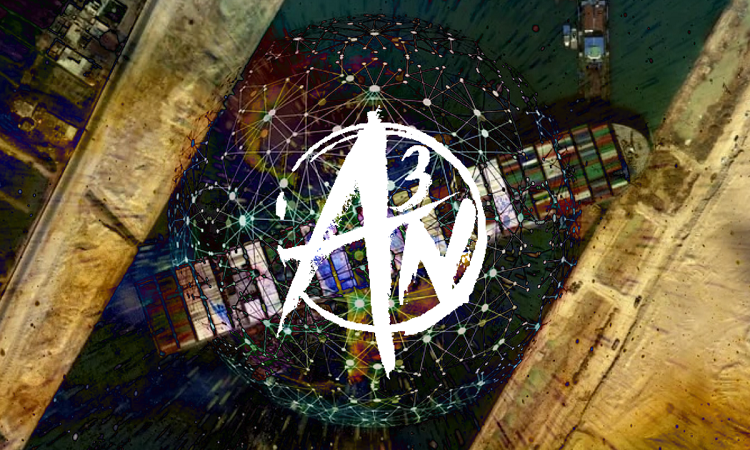
Centralization Fail – The Ever Given and the Suez Canal
You’ve probably heard about the Ever Given, and how it blocked the Suez Canal for days. You’ve probably also heard how very disruptive it was to global Commerce, causing extreme shortfalls in not only its own shipping, but a series of ships caught in a traffic jam behind it. But a good question to ask that very few people are asking is why all of World Trade could be altered by one ship in one canal?
Here at Agorist Nexus, I’ve already written multiple times about centralization, and how it leads to a wide variety of problems which could be circumvented by decentralization. This is a good example of that. And not just because I’m biased against centralists.
The first question you have to ask if you want to get to the bottom of this problem is why does this ship halfway around the world affect America? The short answer is that globalists made trade internationally interdependent for many decades, after centuries of making global trade routes through the use of naval fleets and more. Because of this, and because of the slow crawl of consumerism, global trade has slowly become more and more streamlined, emphasizing powerful multinational corporations, and disempowering local vendors and producers.
It’s the standard “they took our jobs” trope. Empowered by regulations and the “too big to fail” mentality, these corporations have shifted labor to the cheapest possible location(s) in as many ways as they could get away with. In order to get goods from those places to the places they’re going, international sea trade routes have been established, among other routes such as land and air. The reason you can get 2 day shipping is because of this paradigm, and it means that in order to remain usable, a very complex system has to go off without a hitch, on a daily basis.
That’s not what happened when the Ever Given was traveling through the Suez Canal. The canal is wide, but just wide enough to allow the passage of one large ship, so ships have to take turns passing through it going opposite directions. High winds can batter tall cargo, changing the balance and direction of a ship. These 46 mile-per-hour winds were bad enough to cause a sandstorm, and certainly enough to cause problems for the ship. That, combined with strange currents, caused the ship to require multiple large corrections, one of which lodged it into the side of the Suez Canal. The remaining momentum from the movement of this giant vessel forced the tail end of the ship to wedge the ship between the two walls of the canal, causing a blockage which would take 6 days to correct.
It’s very difficult to move a ship of that size, especially with things that can fit alongside it in the canal, and the worst part was, ships that didn’t know any better, or thought he blockage would be cleared more quickly, were very quickly caught in a traffic jam, meaning not only was the cargo of the Ever Given held up, but so was that of a large amount of other vessels, all waiting for this traffic jam to expire. If you think your rush hour is bad, try waiting for days.
The news media covered this high profile incident like a hawk, and milked it extremely dry. But what they didn’t report on was the central reason behind the problems, that being centralization. You see, they rely on these megacorporations, the international banking scheme, the military industrial complex, and more. That’s what pays their bills, and it’s also the reason they very rarely criticize them on anything substantive. It’s the reason that if you want real news, you should probably get it from a variety of sources, and include some alternative media in your diet. It’s healthy for you. If people adopt healthier lifestyles, and avoid the consumerism rampant in megacorporations supported by big media institutions like Fox News, MSNBC, CNN, and more, they would lose funding.
They can’t have that, so they encourage your unhealthy habits as much as possible, only later complaining about your lack of health, when they can use it as a way to scare you into consuming their content with more headlines about obesity, and all of the medical symptoms that arise from it, or credit card debt, or any other sort of thing affiliated with the hyperconsumerism of American state capitalism. And that doesn’t even get into state-funded media, and the outlets that claim to be not state-funded, but which later are proven to have been funded by the state, or at least partially supported by it. Those ones really need you to buy into the fear, so that they can keep building their empires around the world, and expanding their hegemonic reach. Global trade has always come with global statism.
Global trade has always brought with it the same mentality of conquest and imperialism that formed the original American colonies to begin with. Now, it justifies building military bases around the world, so that trade routes can remain secure, and so that resource-rich countries, with extremely poor populations, unable to fight back, can be exploited for those resources by statists who have nothing to lose. 24 of the ships held up by the Ever Given were carrying crude oil. That oil is the result of globalism, and the transportation of oil on the petrodollar system. I discussed that in my article about why economic collapse is inevitable, and a long time coming. Oil is a heavy currency around the world, and in this case, it made up a significant amount of dead weight in the canal, which is usually a very oil heavy trade route. Why aren’t more countries drilling their own oil, and producing their own stocks? Well, because it can be provided cheaper in other places, largely due to state intervention, and because the dollar is the only currency in which oil can be traded.
This game has led to a significant amount of war and other sorts of conflict, not the least of which is the soft power competitions of trade, heavily influenced by the looming threat of sanctions and embargoes. But even the smallest stuff, like the fees collected by governments in order to pass through their waters, can hold up a ship. It took 6 days for the ship to be freed, and even after that, it couldn’t leave the water way. This is because the government of Egypt demanded $1 billion because the blockage had prevented them from collecting fees from a ton of ships. There will be more potential costs in this regard as well, so the ship’s owner filed a suit against the ship’s operator in the UK’s high court, attempting to divert liability to the parent company responsible, which is a complicated arrangement. From Washington Post:
“Flagged in Panama, the Ever Given is owned by two Japanese firms, Luster Maritime and Higaki Sangyo Kaisha, which are the plaintiffs in the lawsuit and are both subsidiaries of holding company Shoei Kisen Kaisha (itself a subsidiary of Japanese shipbuilder Imabari.) It is being leased by Evergreen Marine Corporation, a Taiwan-based conglomerate listed as the defendant. On top of that, the ship’s technical manager is Bernhard Schulte Shipmanagement, a German entity that isn’t a party to the lawsuit and was responsible for hiring the Indian crew.”
Keep in mind, all of this prevented it from moving out of the canal, even when it was freed. All of these centralized organizations, from the state to its corporate imitators, are all looking to divert blame to somebody else, rather than solve the problem as quickly as possible. Keep in mind, 12% of global trade had already been affected for 6 days, by a centralized mess of authoritarianism and corporate malfeasance. Meanwhile, weight had to be removed from the ship, it had to be dug out of the muck it was in, and it had to be tugged free, and re-floated, before anything even happened to begin with, and then the real quagmire came up when the state and its corporate allies got involved. On the 29th of March, after days of effort to free the hull, 14 tugboats and high tide conditions allowed the ship to be moved, and it was subsequently moved to a lake, where the traffic was allowed to clear around it, while it remained mired by the state.
The economic impact can’t be understated either. Hundreds of millions of dollars lost every hour in terms of goods, and $9 billion worth of goods disrupted a day, in addition to tens of millions of dollars disrupted from Egypt’s fee collection, and all because of one large and slightly overloaded ship and the wrong weather conditions. Entire industries were at risk of collapsing, and might still, in the months to come, with domino effects reaching into a ton of industries, causing shortages in a variety of places. Massive global price fluctuations on a variety of things occurred, and the world watched as a seemingly small incident turned into a gigantic fiasco. But the question remains, why do we rely on a narrow strip of water for 12% of global trade? And is there an alternative?
The truth is, the state loves this sort of thing, because it makes it seem like the economy is too global and too complex to solve trade problems without their help, and it makes it seem justified that Egypt gets to collect a huge amount of money from passing ships just for the privilege of using a large channel of water, and that governments get to determine how travel works on large scales like this, because we wouldn’t want this sort of thing to happen again, now would we? Also worth noting is that Americans are so often consumed by why things halfway around the world affect them, but so little occupied with the effect that they have on peoplwae halfway around the world, on a regular basis. All of these things intertwine to create a behemoth of questionable business practices, and occasionally outright slavery, while destroying ecosystems, and creating even worse conditions for people who are already too poor to defend themselves in less privileged nations. If that sounds bad, I bet you’re looking for solutions. Well let me introduce you to two concepts in case you don’t already know them.
The first concept I’ll go over is decentralization. It’s something I’ve gone over in a variety of articles, and other content, both here and elsewhere, and it’s a concept that’s been gone over by a wide variety of people, many of them operating under libertarian ideals. Centralization often requires the external threat of force in some way, to prevent smaller alternatives from cropping up. The recent pandemic has certainly been used as an excuse to centralize a significant amount of power in the hands of megacorporations, and their statist allies. It’s also massively inefficient, as can be adequately demonstrated by the failure of centralized institutions and situations like these.
What decentralization does is fairly apparent. It makes smaller structures, and in more places, to serve more people more directly, and have less of these central authorities deciding how things work. It allows for less bureaucracy, more efficiency, and faster service. Now, it can be total decentralization, where there’s no central authority at all, or it can just be a process of decentralizing the big authorities, and creating a lot of smaller ones. It breaks up monopolies and allows for a greater amount and scale of competition, so that little people have a greater likelihood of being able to compete in the marketplace. It also prevents situations like these from impacting 12% of global trade, and part of that reason is because of what I’m about to discuss.
Globalization has been a slow grinding process by which centralized authorities have seized much of the globe, in an attempt to control all activities around the globe, generally for the purposes of neoliberalism, profit, and colonial/imperial military conflict. It all goes to strengthen huge statist hegemonies and empower the ruling elites to increase and strengthen their control. When a lot of people think about globalism, they think about the caricature of Alex Jones screaming about them, but he’s not actually wrong. And when he goes over the fact that the Bilderberg group is an evil organization and people should be very concerned about them, he’s not wrong. The chief reason for this is because globalism is the primary driving factor behind global tyranny. They fancy themselves the builders of the New World, and they think this gives them the right to control the world, meaning any inefficiencies are not a criticism of the state, but rather an excuse to grow it more.
If you think that’s bullshit, look into a concept called localism, or localization. These concepts emphasize that doing things in your own community, rather than relying on people far away to take care of things for you is best. It emphasizes using the kinds of farmer’s markets and bazaars Lily Forester talks about in her articles, and the rugged individualism and cost-cutting promoted by people like Storm Delagora. Basically, using these two concepts, you can realize that the power to preserve global trade is in deglobalizing it. Ultimately, the power is in the average person’s hands, should they desire it enough to use it; and they can use that power to gradually stop giving it to the powers that should not be, so that they can continue this charade, which is clearly so fragile as to come to a grinding halt because of a literal boat accident. The answer is what it has been for awhile, which is agorism…
The use of black and grey markets to choke the state and its allies, by stepping in where they fail, and being more successful where they succeed, has a huge amount of swaying power over the common person.
When I describe agorism to people, and I describe it in terms such as these, it makes sense. This is because everybody at least a little bit knows that this system makes no sense as it stands, at least not more sense than alternatives could. People are looking for new ways to trade and exist in society in general. And with incidents like this in the news, it’s never a better time than now to explain these concepts to people. So, I hope you do, and I hope you start to decentralize and localize in your own life as much as possible, and maybe try to live a little bit more minimally too. Hyperconsumerism is basically the lifeblood of the state, keeping you pacified, and keeping your labor and time fueling the machines they run. This global trade wouldn’t be nearly this much of an issue if the world didn’t rely on the globe, but relied more on their neighbors, like things used to be…like things could be again.
That is, if you want it. If you do, now is the time to hit up that “Action!” part of Agora! Anarchy! Action!
And smash the state.









